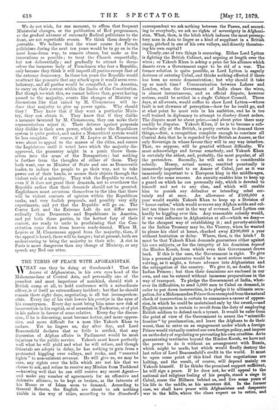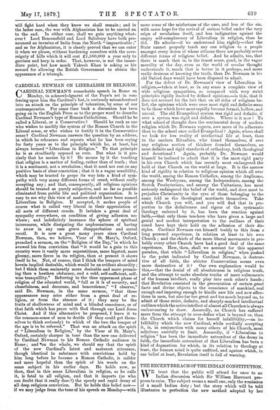THE TERMS OF PEACE WITH AFGHANISTAN.
WHAT can they be doing at Gundamuk ? That the Ameer of Afghanistan, in his own eyes head of the Mahommedans of Central Asia, and personally one of the proudest and most imperious of mankind, should visit a British camp at all, to hold conference with a subordinate officer, is of itself an extraordinary incident ; but that he should remain there eight days, negotiating, is all but incomprehen- sible. Every day of his visit lowers his prestige in the eyes of his countrymen. Every day must bring him some new risk of insurrection in his capital, or of secession in Turkestan, or of plot in his palace in favour of some relative. Every day the discus- sion, if he is discussing, must become hotter, and more oppres- sive, and more difficult for a man like Yakoob Khan to endure. Yet he lingers on, day after day, and Lord Beaconsfield declares that so little is settled, that any discussion of Afghan affairs in Parliament would be most injurious to the public service. Yakoob must know perfectly well what he will yield and what he will refuse, and though Orientals are adepts in delay, he has nothing to gain from a protracted higgling over valleys, and rocks, and "reserved rights" to non-existent revenue. He will give us, we may be sure, any rights over the hills which are not his that we choose to ask, and refuse to receive any Mission from Tashkend —knowing well that he can still receive any secret Agent— and make any number of agreements for an offensive and defensive alliance, to be kept or broken, as the interests of his House or of Islam seem to demand. According to General Roberts, the English are about to ask nothing visible in the way of cities, according to the 'Standard's correspondent we ask nothing between the Passes, and accord- ing to everybody, we ask no rights of sovereignty in Afghani- stan. What, then, is the hitch which induces the most peremp- tory man in Asia to linger as a kind of suppliant in a British camp, pitched in one of his own valleys, and directly threaten- ing his own capital ?• Clearly, one of two things is occurring. Either Lord Lytton is fighting the British Cabinet, and arguing at length over the wires ; or Yakoob Khan is asking a price for his alliance which daunts even a Government eager to be rid of a war. The former solution is quite possible, as Lord Lytton is eagerly desirous of entering Cabul, and thinks nothing effected if there has been no scenic demonstration ; but why should it take up so much time ? Communication between Lahore and London, when the Government of India clears the wires, is almost instantaneous, and an official dispute, however serious, could be settled in a single Cabinet Council. Three days, at all events, would suffice to show Lord Lytton—whose fault is not slowness of perception—how far he could go, and at what point he must rein in his ambition, and he is too well trained in diplomacy to attempt to disobey direct orders. The dispute must be about price,—and about price there may readily be disputes. Yakoob Khan, if he is to become a sub- ordinate ally of the British, is pretty certain to demand three things,—first, a recognition complete enough to convince all Central Asia that he is regarded by the British as Ameer, as the only Sovereign in whose favour they will in any way interfere. That, we suppose, will be granted without difficulty. We must acknowledge and favour somebody, and Yakoob Khan is certainly the ablest, and, probably, the most popular, of all the pretenders. Secondly, he will ask for a considerable subsidy. Money, actual money, remitted punctually is immensely important to an Ameer of Cabul, just as it was immensely important to a European king in the middle-ages, and for the same reasons. An annuity enables him to keep up a guard on which he can personally rely, which is devoted to himself and not to any clan, and which will enable him to punish any defaulter or intending rebel cer- tainly and at once. An allowance of £100,000 a year would enable Yakoob Khan to keep up a Division of "house caries," which would overawe any Afghan noble and col- lect ten times its cost in the way of revenue. Lord Lytton can hardly be higgling over this. Any reasonable subsidy would, if we want influence in Afghanistan at all—which we denybe the cheapest way of establishing it ; and poverty-stricken as the Indian Treasury may be, the Viceroy, when he wanted to please his chief at home, chucked away £200,000 a year without hesitation or delay. Where, then, is the hitch ? It must be that Yakoob Khan demands guarantees either against his own subjects, or for the integrity of his dominion beyond the Hindoo Koosh, from which even this Government draws back. If this is the case, the Government is right. To give him a personal guarantee would be a most serious matter, in- volving, as it might, a future advance into Afghanistan and the subjugation of the country. We give it, no doubt, to the Indian Princes ; but then their dominions are enclosed in our own, and can be entered without immense preparations in the way of transport. To pledge the Government of India, what- ever its difficulties, to send 5,000 men to Cabul on demand, in order to put down insurrection, is to pledge it to ultimate occu- pation, for a Mahommedan Prince thus exempted from thenatural check of insurrection is certain to commence a career of oppres- sion, in which he could be maintained only by the sword,—and English opinion is certain to revolt from the duty of employing British soldiers to defend such a tyrant. It would be safer from the point of view of the Government to annex the "scientific frontier" by proclamation, and leave the Afghans to do their worst, than to enter on an engagement under which a foreign Prince would virtually control our own foreign policy, and impose on us the duty of regulating or preventing his own cruelties. As to guaranteeing territories beyond the Hindoo Koosh, we have not the power to do it without an arrangement with Russia, which might be made, but which would finally destroy the last relics of Lord Beaconsfield's credit in the world. It must be upon some point of this kind that the negotiations are halting, and the result, of course, will depend mainly on Yakoob himself. If he thinks the promised support sufficient, he will sign a peace. If he does not, he will appeal to the national and religious feeling of his people, stand a siege in Cabul, rouse the Hillmen behind us, and live some years of his life in the saddle, as his ancestors did. In the former case, we shall have peace with Afghanistan and desperate war in the hills, where the clans expect us to retire, and
will fight hard when they know we shall remain ; and in the latter case, the war with Afghanistan has to be carried on to the end. In either case, shall we gain anything what- ever? Lord Beaconsfield and Lord Salisbury have both pro- nounced an invasion of India from the North "impracticable ;" and as for Afghanistan, it is clearly proved that we can enter it when we please, without burdening ourselves with the sove- reignty of hills which it will cost £1,500,000 a year only to garrison and keep in order. That, however, is not the imme- diate point, but how much Yakoob Khan is asking as his reward for allowing the British Government to obtain the appearance of a triumph.



































 Previous page
Previous page